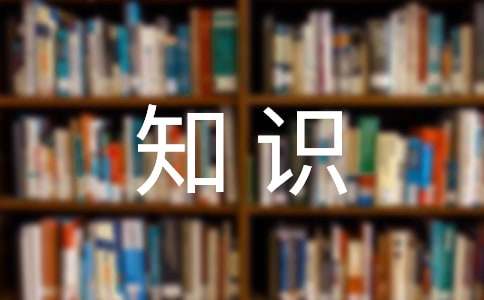- 相關推薦
初一英語必考知識要點歸納
很多初一的學生不知道怎么備考英語,其實除了復習課本知識,考前復習一些必考的知識點對考試有很大的幫助。下面是百分網小編為大家整理的初一英語必考知識歸納,希望對大家有用!

初一英語必考知識要點歸納 1
一、助動詞(do, does )的用法
只有實意動詞作謂語時才涉及使用助動詞。以like為例:
1、當句子為肯定句時不涉及使用助動詞,只涉及“主謂一致”原則。
eg : I like English a lot.
Michael likes Chinese food very much.
2、當句子為否定句時,要根據主語的'人稱來決定使用相應的助動詞:當主語為“三單”時,要使用does;當主語為“非三單”時,用助動詞原形do。例如把下列句子變否定句:
eg : Kangkang likes math.----Kangkang doesnt like math.
They like sports.------They dont like sports.
3、當句子變疑問句時,同樣要根據句子的主語來決定在句首使用Do或Does.例如下列句子變問句:
eg : Michael likes Chinese Food.----Does Michael like Chinese food?
Yes, he does./ No, he doesnt.
Jane and Helen like music.----Do Jand and Helen like music? Yes, they do./ No, they dont.
二、like一詞的用法
like用作及物動詞,譯為“喜歡”。
1、后接名詞或代詞,表示喜歡某人或某物。
eg :I like the baby very much. 我非常喜歡這個小孩。
2、后接動名詞(v. -ing),表示“喜歡做某事”,著重于習慣、愛好。
eg :Tom likes playing football. 湯姆喜歡踢足球。
3、后接動詞不定式(to do ),表示“偶爾地喜歡做某事”,著重于某次具體的行為。
eg :I like reading, but I like to watch TV this evening. 我喜歡讀書,但我今晚想看電視。
初一英語必考知識要點歸納 2
1)問候語:
Good morning/ afternoon/ evening.
How are you?---Just OK, thank you. How are you?---Not bad, thanks.
Hi! Hello! How do you do?
2)道別用語:
Nice/ Glad to meet/ see you.(meet用于初次見面,see用于熟人間)
Nice to meet/ see you, too.
Goodbye. Byebye. Bye. See you (later/ tomorrow/ next time)! So long! Good night!
3)介紹人或者物的句型:This is...
4)Excuse me.與Im sorry.的區別:
Excuse me.是要引起對方的注意,而Im sorry.則是向對方道歉。
5)詞組be from = come from
6)當問句中問到this/ that時,回答要用it;問到these/ those時,要用they來回答。
例如: Whats this in English?----Its an eraser.
What are those?----They are books.
7)對Thanks.的回答:Thats OK./ Youre welcome./ My pleasur.
8)look the same = have the same looks
give sth. to sb. = give sb. sth.
be like = look like
in the tree/ on the tree (樹上結的、長出來的`用on,否則用in)
in red(穿著紅色的衣服)
初一英語必考知識要點歸納 3
1)speak的用法
speak與say不同:speak表示“說”的動作,不表示“說”的內容;say則表示“說”的內容。
speak后面除了能接“語言”外,不能直接接東西,后面加了to則表示“對......說”。
help sb. with sth.(幫助某人做/補習......)
want to do sth.(想要做某事)
would like to do sth.
not...at all(一點都不);Not at all.(沒關系/別介意)
like...a lot = like...very much
2)some和any的區別:
口訣:some用于肯定句,否定、疑問變any。例如:
I have some money.
I dont have any money.
Do you have any money?
3)have a seat = take a seat(請隨便坐)
4)祈使句(表示命令或請求的句子)
祈使句一般都省略了主語You,所以其否定句直接用Dont開頭。例如:
Dont go there!
5)問職業:
What does sb. do? What is sb.?
Whats sb.s job?
6)work與job的區別:
work是未必有報酬的“工作”,例如homework, housework;而job則一定是有報酬的'“工作”。
7)on指在物體的表面,不論這個面是否水平的,例如:
on the desk/ wall/ farm/ playground
8)in hospital(住院);in the hospital(在醫院里)
look after(照料/照顧/照看)
help oneself(請自便/隨便吃)
初一英語必考知識要點歸納 4
1. What do you see? I see a frog/rabbit/bee/bird.
2. What do you hear? I hear a hen/sheep/dog/cat.
3. Smell the noodles, Ben. Taste the soup, Kitty. It’s nice. Yummy. Yummy.
4. I like balls. I like dolls. I like kites. I like bicycles.
5. Do you like sweets/jelly/biscuit/ice cream? Yes./ No. I like…
6. Hello! What do you like? I like water/cola/juice/milk.
7. Spring is green. Spring is warm. Summer is red. Summer is hot.
8. How is the weather? It’s cloudy/sunny/rainy/windy.
9. What do you need? I need a new T-shirt/dress/shorts/blouse.
10. What can you do? I can sing/dance/draw.What can she/he do? She/He can ride/skip/play/fly.
11. Happy New Year! A gift /card for you, Kitty. Thank you.
12. I’m the wolf/boy/farmer /narrator.
初一英語必考知識要點歸納 5
一、48個國際音標及26個英文字母的正確書寫
要熟練掌握元音和輔音,5個元音字母(a, e, i, o, u),字母的正確占格及單詞間距。
二、be動詞的用法
be動詞有三種變形,分別是:am, is, are。記憶口訣:
“我”用am, “你”用are, is用于“他、她、它”;單數全都用is,復數全部都用are。
三、人稱及人稱代詞的不同形式(主格和賓格)
1、三種人稱:第一人稱(I, we),第二人稱(you, you),第三人稱(he, she, it, Maria)。
2、人稱代詞的主格,即人稱代詞位于句子主語位置時的形態:I, We, You, You, He, She, It, Maria。
3、人稱代詞的賓格,即人稱代詞位于句子賓語位置時的形態:me, us, you, you, him, her, it。
4、形容詞性物主代詞:my, our, your, your, his, her, its, their。
5、名詞性物主代詞:mine, ours, yours, yours, his, hers, its, theirs。
6、反身代詞:myself, ourselves, yourself, yourselves, himself, herself, itself, themselves。
四、基數詞(表示數量多少的'詞,大致相當于代數里的自然數)
zero, one, two, three, four, five, six, seven, eight, nine, ten, eleven, twelve, thirteen, fourteen, fifteen, sixteen, seventeen, eighteen, nineteen, twenty, twenty-one, twenty-two, twenty-three,twenty-four, twenty-five, twenty-six, twenty-seven, twenty-eight, twenty-nine, thirty, forty, fifty, sixty,seventy, eighty, ninety, one hundred,one hundred and one。
五、一般疑問句及特殊疑問句
1、一般疑問句:能用Yes或No來回答的問句。一般疑問句句尾讀升調。
2、特殊疑問句:不能用Yes或No來回答的問句。特殊疑問句句尾讀降調。
六、可數名詞變復數
可數名詞變復數時,有規則變化和不規則變化兩種。
1、規則變化:
1)一般情況直接在詞尾加“-s ”,如:cake-cakes, bag-bags, day-days, face-faces, orange-oranges等;
2)以s, x, sh, ch結尾的詞,要在詞尾加“-es ”,如:bus-buses, watch-watches, box-boxes等;
3)以輔音字母加y結尾的詞,變y為i再加“-es ”,如:baby-babies, country-countries, family-families等;
4)部分以f (e)結尾的詞,變f (e)為“ves ”,如:knife-knives, half-halves等;
5)以o結尾的詞,加“-s ”或“-es ”,如:zoo-zoos, photo-photos, tomato-tomatoes, potato-potatoes等。記憶口訣:除了“英雄”hero外,凡是能吃的,加“-es ”,不能吃的加“-s ”。
2、不規則變化:
1)改變單數名詞中的元音字母:man-men, woman-women, foot-feet, tooth-teeth等;
2)單、復同形:sheep-sheep, Chinnese-Chinese, Japanese-Japanese等;
3)其他形式:mouse-mice, child-children等。
七、簡單句的成分及主謂一致原則
最基本構成:主語+謂語+賓語,其中謂語由動詞來充當。
主謂一致原則,就是句子的謂語要始終與主語保持數量上的一致性。當主語是第三人稱單數(簡稱“三單”)時,謂語動詞也要相應變成單數形式;當主語非“三單”時,謂語動詞就用原形。實意動詞變“三單”的規則如下:
1)一般動詞在詞尾加“-s ”,如:like-likes, tell-tells, play-plays等;
2)以字母s, x,ch, sh結尾的動詞加“-es ”,如:guess-guesses, teach-teaches, watch-watches等;
3)以o結尾的動詞一般加“-es ”,如:do-does, go-goes等;
4)以輔音字母加y結尾的動詞,先變y為i,再加“-而是”,如:fly-flies, carry-carries等;
5)have的三單形式是has。
八、冠詞的用法(名詞前面必須要有冠詞)
冠詞分為定冠詞(the)和不定冠詞(a, an)兩種。
1、定冠詞the表示“特指”,可譯為“這個”、“那個”、“這些”、“那些”。
2、不定冠詞a,an用來表明(可數)名詞的數量是“一個”。an用于以元音開頭(注意不是以元音字母開頭)的單詞前,a則英語非元音開頭的單詞前。
3、不定冠詞a,an與基數詞one的區別是:不定冠詞不是刻意強調“數量”,而基數詞則強調“數量”。
【初一英語必考知識要點歸納】相關文章:
高中英語必考知識要點歸納03-08
歷史中考必考知識內容歸納01-11
天津高考政治知識要點歸納06-09
最新小學語文知識要點歸納06-13
初中政治背誦知識要點歸納03-12
小學語文知識要點歸納匯總03-09
中考歷史必考知識點總結歸納06-13
小升初考試語文必考知識點歸納06-08
初二數學必考知識點歸納12-23
江蘇歷史中考必考知識點歸納02-22